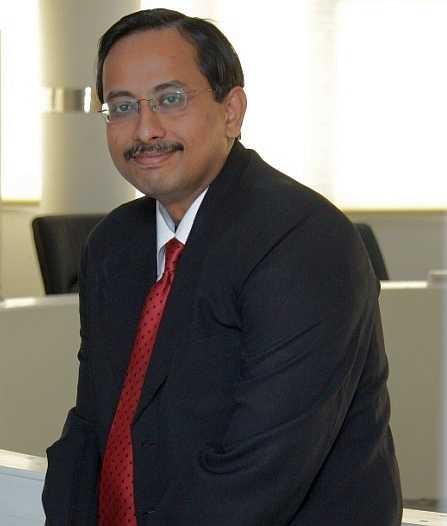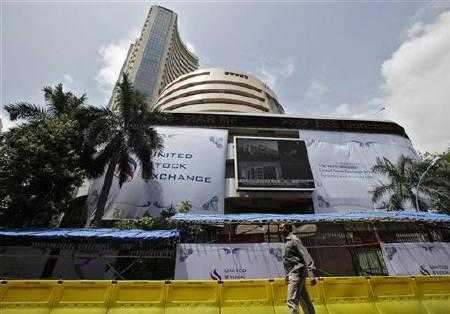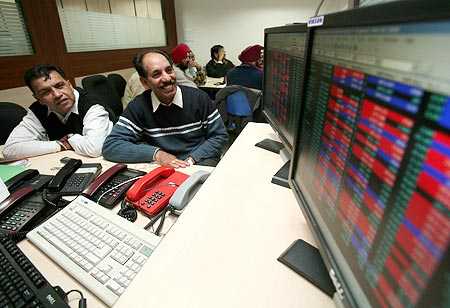 | « Back to article | Print this article |
'Companies don't need only MBAs for all their jobs'
Managing director and CEO of BSE Institute, Ambarish Datta, explains why courses offered by it are valuable and why those doing these courses stand a better chance in the job market.
A dozen odd undergraduate students sit scattered on neatly lined chairs in the Bombay Stock Exchange's Rotunda building. This is the place where until 1995 the famed brokers of Dalal Street would bid and sell shares by shouting to their lung's capacity. This practice stopped once the BSE introduced electronic trading platforms in 1995.
Today, the same floor is being used either to ring in new IPO listings or as in this case by young students. These students are here to enroll for one of the 70 subjects and certification courses that the BSE Institute – a 100 per cent subsidiary of BSE -- offers to undergraduates, postgraduates and those already a part of the banking, financial services and insurance (BFSI) sector.
These undergraduate students are busy filling their forms, submitting applications and going through interviews with a bevy of BSE Institute officials.
"The people who founded it (the BSE Institute) knew way back then (in 1989) the important role the financial markets would play in India's emergence as an economic powerhouse," says Ambarish Datta, the managing director and CEO of BSE Institute.
"Knowledge of these financial markets, they knew, would be the key to help Indians enjoy the benefits of economic prosperity," he adds.
The Institute has at its disposal some 15,000 sq ft of real estate available exclusively to impart training in financial markets. It teaches some 10,000 people and certifies 60,000 people online every year across India in courses that range from four-day certified courses to full time MBA programmes.
Three baskets offered by BSE Institute
Broadly, the BSE Institute has categorised the 70 subjects that it offers into three baskets: short-term, mid-term and long-term courses for undergrads, part-time postgraduate diploma courses in stock markets and more recently a full-time MBA programme specialising in financial markets.
"If you look at it we are currently placed on three broad spectrums. First is skill upgradation, where we offer short-term courses to people who are already in the market. Second programme is for students who want to get into financial markets but don't have the skills. The third programme is the MBA for people who have already graduated but want to build their finite knowledge and add to it," says Datta from his 19th floor office overlooking the majestic Taj hotel and the expansive Arabian Sea.
The BSE Institute has started an MBA in financial markets since July 2011. About 140 students out of 600 who appeared were selected based on their CAT scores and/or on a written test conducted by the Institute.
Elaborating on the Institute's focus on a bouquet of courses that caters to undergraduate students Datta says, "If you look at the entire financial markets there are lot of constituents. There are broking houses, financial institutions, analysts, research companies, KPOs, stock exchanges etc. All of them don't need only MBAs for all their jobs."
Filling in the industry-academic void
Defending the logic behind these courses and their employability quotients Datta adds: When we looked at what companies were looking out for we realised a lot of them hired commerce, economics and allied graduate students for financial market jobs.
But the problem with such recruitments, argues Datta, is that employers train them extensively for six months so that they could start productive work. But even after six months' training there is no guarantee that these graduates would become productive. "By that time some of these recruits would become so smart that employers actually lose these people to attrition. The process to hire fresh talent begins all over again. So for these corporates there is no incentive to train them well".
The BSE Institute steps in to fill this void. The Institute, feels Datta, has created a programme that addresses this problem at an undergraduate level concurrent to students' graduation. However, he has no doubts that skill development is only complementary to one's graduation.
"Skill development cannot replace graduation because graduation gives you some benchmark of knowledge. Our financial market programme for undergraduates is a part-time, three-days a week, two hours each, four-semester course." Each semester is for six months and at the end of the course students get to work with the constituents and intermediaries of financial markets.
However, most of these courses have been designed keeping in mind the demand from the industry. That, in a way, ultimately decides the employability of the students trained at the BSE Institute.
"As a regulator (BSE) and training institute (BSE Institute) we have been working with most of these intermediaries and constituents (companies in the BFSI sector). We have a very good working relationship with them. The idea is to save the corporates time and energy they normally spend in training graduates they hire and save time of students by making them productive without having to undergo training after they get hired," says Datta.
Additionally, by the virtue of being part of the BSE, the BSE Institute has access to people in the industry who matter, and who, in fact, have helped the Institute design courses that dovetail with industry needs. Probe further and Datta immediately dishes out the example of its most-recently launched full-time, two-year MBA course.
"If you look at our MBA in Financial Market course it is the only course that looks at the varied amount of inputs related to financial markets including things like securities law and corporate governance. You would not find any MBA programme that actually offers in-depth financial market related subjects at masters' level".
Faculty and fees
Financial markets is a domain that needs lot of hands-on, practical knowledge to be able to impart training to students not all of whom may have definite knowledge about the markets. And this is where the faculty who teach these programmes play a crucial role. "Most of our professors are practising managers in the market," informs Datta.
For example, the people who have done four to five eminent deals in the market deliver mergers and acquisition lectures. People who have done about five private equity deals deliver lectures on private equity. "Most of our faculty are eminent professionals who work in the industry and come back and share their knowledge," says Datta.
Talking about the fees charged by the Institute for these courses, Datta says that the courses are moderately priced. "Our full-time MBA programme is priced at Rs 2.5 lakh this year. Our Global Financial Market Professional programme meant for college students costs around Rs 1.2 lakh for two and half years with installments".
Knowing fully well that most of the students enrolling for these programmes may not have the financial wherewithal to pay for their term fees the BSE Institute has tied up with a number of public and private sector banks. "For MBA courses we do have tie-ups with banks where they can go and seek loans".
Must-do programme
Just one," says Datta. "Any undergraduate who has passed Class XII exams in India is eligible to do Global Financial Market Professional course.
Datta reasons out like a salesman selling his most valuable asset. "GFMP is industry-defined course. It is aligned to industry needs. It is a part-time course that offers flexibility to students as well as those who work during the day. Thirdly, it allows you to build your skills step-by-step".
He emphasises that while one need to master the complex subjects first it can nevertheless be done in a graded manner.
"Fourthly, it is a modular course," Datta continues. "You don't need to do the entire two-year course at a stretch. You can do it for six months, practice in the industry, come back and do the next module, practice then again come back and complete the course".
Datta takes great pride in what he is doing and what the BSE Institute under him is set to achieve. Pitching his courses against the competition's he says, "Most of the training institutes are either the subset of the people who are part of the industry -- like a broker or a mutual fund – or are private entities who have nothing to do with the market. We are the only ones unbiased as a training provider. I don't sell an insurance plan or a mutual fund product and that helps us impart unbiased training to our students. That itself makes our programmes unique vis-a-vis competition."
Finally, this is how Datta pitches the value of what the BSE Institute under him is offering: Remember, financial education is the only thing that actually run without any capital. This education can help you manage your own money; you can be an advisor to others and still make money.




